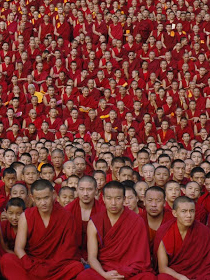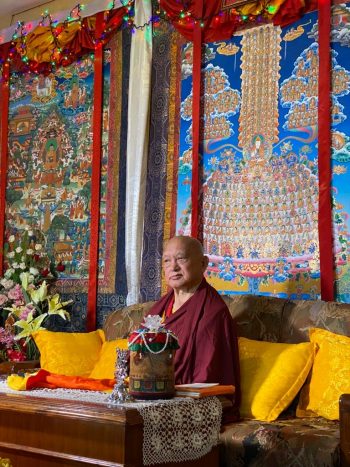- Home
- FPMT Homepage
Foundation for the Preservation of the Mahayana Tradition
The FPMT is an organization devoted to preserving and spreading Mahayana Buddhism worldwide by creating opportunities to listen, reflect, meditate, practice and actualize the unmistaken teachings of the Buddha and based on that experience spreading the Dharma to sentient beings. We provide integrated education through which people’s minds and hearts can be transformed into their highest potential for the benefit of others, inspired by an attitude of universal responsibility and service. We are committed to creating harmonious environments and helping all beings develop their full potential of infinite wisdom and compassion. Our organization is based on the Buddhist tradition of Lama Tsongkhapa of Tibet as taught to us by our founders Lama Thubten Yeshe and Lama Thubten Zopa Rinpoche.
- Willkommen
Die Stiftung zur Erhaltung der Mahayana Tradition (FPMT) ist eine Organisation, die sich weltweit für die Erhaltung und Verbreitung des Mahayana-Buddhismus einsetzt, indem sie Möglichkeiten schafft, den makellosen Lehren des Buddha zuzuhören, über sie zur reflektieren und zu meditieren und auf der Grundlage dieser Erfahrung das Dharma unter den Lebewesen zu verbreiten.
Wir bieten integrierte Schulungswege an, durch denen der Geist und das Herz der Menschen in ihr höchstes Potential verwandelt werden zum Wohl der anderen – inspiriert durch eine Haltung der universellen Verantwortung und dem Wunsch zu dienen. Wir haben uns verpflichtet, harmonische Umgebungen zu schaffen und allen Wesen zu helfen, ihr volles Potenzial unendlicher Weisheit und grenzenlosen Mitgefühls zu verwirklichen.
Unsere Organisation basiert auf der buddhistischen Tradition von Lama Tsongkhapa von Tibet, so wie sie uns von unseren Gründern Lama Thubten Yeshe und Lama Thubten Zopa Rinpoche gelehrt wird.
- Bienvenidos
La Fundación para la preservación de la tradición Mahayana (FPMT) es una organización que se dedica a preservar y difundir el budismo Mahayana en todo el mundo, creando oportunidades para escuchar, reflexionar, meditar, practicar y actualizar las enseñanzas inconfundibles de Buda y en base a esa experiencia difundir el Dharma a los seres.
Proporcionamos una educación integrada a través de la cual las mentes y los corazones de las personas se pueden transformar en su mayor potencial para el beneficio de los demás, inspirados por una actitud de responsabilidad y servicio universales. Estamos comprometidos a crear ambientes armoniosos y ayudar a todos los seres a desarrollar todo su potencial de infinita sabiduría y compasión.
Nuestra organización se basa en la tradición budista de Lama Tsongkhapa del Tíbet como nos lo enseñaron nuestros fundadores Lama Thubten Yeshe y Lama Zopa Rinpoche.
A continuación puede ver una lista de los centros y sus páginas web en su lengua preferida.
- Bienvenue
L’organisation de la FPMT a pour vocation la préservation et la diffusion du bouddhisme du mahayana dans le monde entier. Elle offre l’opportunité d’écouter, de réfléchir, de méditer, de pratiquer et de réaliser les enseignements excellents du Bouddha, pour ensuite transmettre le Dharma à tous les êtres. Nous proposons une formation intégrée grâce à laquelle le cœur et l’esprit de chacun peuvent accomplir leur potentiel le plus élevé pour le bien d’autrui, inspirés par le sens du service et une responsabilité universelle. Nous nous engageons à créer un environnement harmonieux et à aider tous les êtres à épanouir leur potentiel illimité de compassion et de sagesse. Notre organisation s’appuie sur la tradition guéloukpa de Lama Tsongkhapa du Tibet, telle qu’elle a été enseignée par nos fondateurs Lama Thoubtèn Yéshé et Lama Zopa Rinpoché.
Visitez le site de notre Editions Mahayana pour les traductions, conseils et nouvelles du Bureau international en français.
Voici une liste de centres et de leurs sites dans votre langue préférée
- Benvenuto
L’FPMT è un organizzazione il cui scopo è preservare e diffondere il Buddhismo Mahayana nel mondo, creando occasioni di ascolto, riflessione, meditazione e pratica dei perfetti insegnamenti del Buddha, al fine di attualizzare e diffondere il Dharma fra tutti gli esseri senzienti.
Offriamo un’educazione integrata, che può trasformare la mente e i cuori delle persone nel loro massimo potenziale, per il beneficio di tutti gli esseri, ispirati da un’attitudine di responsabilità universale e di servizio.
Il nostro obiettivo è quello di creare contesti armoniosi e aiutare tutti gli esseri a sviluppare in modo completo le proprie potenzialità di infinita saggezza e compassione.
La nostra organizzazione si basa sulla tradizione buddhista di Lama Tsongkhapa del Tibet, così come ci è stata insegnata dai nostri fondatori Lama Thubten Yeshe e Lama Zopa Rinpoche.
Di seguito potete trovare un elenco dei centri e dei loro siti nella lingua da voi prescelta.
- 欢迎 / 歡迎
简体中文
“护持大乘法脉基金会”( 英文简称:FPMT。全名:Foundation for the Preservation of the Mahayana Tradition) 是一个致力于护持和弘扬大乘佛法的国际佛教组织。我们提供听闻,思维,禅修,修行和实证佛陀无误教法的机会,以便让一切众生都能够享受佛法的指引和滋润。
我们全力创造和谐融洽的环境, 为人们提供解行并重的完整佛法教育,以便启发内在的环宇悲心及责任心,并开发内心所蕴藏的巨大潜能 — 无限的智慧与悲心 — 以便利益和服务一切有情。
FPMT的创办人是图腾耶喜喇嘛和喇嘛梭巴仁波切。我们所修习的是由两位上师所教导的,西藏喀巴大师的佛法传承。
繁體中文
護持大乘法脈基金會”( 英文簡稱:FPMT。全名:Found
ation for the Preservation of the Mahayana Tradition ) 是一個致力於護持和弘揚大乘佛法的國際佛教組織。我們提供聽聞, 思維,禪修,修行和實證佛陀無誤教法的機會,以便讓一切眾生都能 夠享受佛法的指引和滋潤。 我們全力創造和諧融洽的環境,
為人們提供解行並重的完整佛法教育,以便啟發內在的環宇悲心及責 任心,並開發內心所蘊藏的巨大潛能 — 無限的智慧與悲心 – – 以便利益和服務一切有情。 FPMT的創辦人是圖騰耶喜喇嘛和喇嘛梭巴仁波切。
我們所修習的是由兩位上師所教導的,西藏喀巴大師的佛法傳承。 察看道场信息:
- FPMT Homepage
- News/Media
-
- Study & Practice
-
-
- About FPMT Education Services
- Latest News
- Programs
- New to Buddhism?
- Buddhist Mind Science: Activating Your Potential
- Heart Advice for Death and Dying
- Discovering Buddhism
- Living in the Path
- Exploring Buddhism
- FPMT Basic Program
- FPMT Masters Program
- FPMT In-Depth Meditation Training
- Maitripa College
- Lotsawa Rinchen Zangpo Translator Program
- Universal Education for Compassion & Wisdom
- Online Learning Center
-
- Prayers & Practice Materials
- Overview of Prayers & Practices
- Full Catalogue of Prayers & Practice Materials
- Explore Popular Topics
- Benefiting Animals
- Chenrezig Resources
- Death & Dying Resources
- Lama Chopa (Guru Puja)
- Lama Zopa Rinpoche: Compendium of Precious Instructions
- Lama Zopa Rinpoche: Life Practice Advice
- Lama Zopa Rinpoche Practice Series
- Lamrim Resources
- Mantras
- Prayer Book Updates
- Purification Practices
- Sutras
- Thought Transformation (Lojong)
- Audio Materials
- Dharma Dates - Tibetan Calendar
- Translation Services
- Publishing Services
- Ways to Offer Support
- Prayers & Practice Materials
-
- Teachings and Advice
- Find Teachings and Advice
- Lama Zopa Rinpoche Advice Page
- Lama Zopa Rinpoche: Compendium of Precious Instructions
- Lama Zopa Rinpoche Video Teachings
- ༧སྐྱབས་རྗེ་བཟོད་པ་རིན་པོ་ཆེ་མཆོག་ནས་སྩལ་བའི་བཀའ་སློབ་བརྙན་འཕྲིན།
- Podcasts
- Lama Yeshe Wisdom Archive
- Buddhism FAQ
- Dharma for Young People
- Resources on Holy Objects
- Teachings and Advice
-
-
*If a menu item has a submenu clicking once will expand the menu clicking twice will open the page.
-
-
- Centers
-
- Teachers
-
- Projects
-
-
-
-
*If a menu item has a submenu clicking once will expand the menu clicking twice will open the page.
-
-
- FPMT
-
-
-
-
-
Live with compassion. Work with compassion. Die with compassion. Meditate with compassion. Enjoy with compassion. When problems come, experience them with compassion.
Lama Zopa Rinpoche
-
-
-
- Shop
-
-
-
The Foundation Store is FPMT’s online shop and features a vast selection of Buddhist study and practice materials written or recommended by our lineage gurus. These items include homestudy programs, prayers and practices in PDF or eBook format, materials for children, and other resources to support practitioners.
Items displayed in the shop are made available for Dharma practice and educational purposes, and never for the purpose of profiting from their sale. Please read FPMT Foundation Store Policy Regarding Dharma Items for more information.
-
-
Lama Zopa Rinpoche News and Advice
4

Lama Zopa Rinpoche, Kopan Monastery, April 2020. Photo by Ven. Lobsang Sherab.
Lama Zopa Rinpoche continues his video teachings from Kopan Monastery in Nepal during the coronavirus pandemic.
In this video Rinpoche emphasizes transforming hardships and obstacles into the conditions that can be used to develop your Dharma practice.
“Then all these bad conditions, all these, the virus, so many people dying, sick, famine,” Rinpoche says, “then these things utilizing, instead of obstacles, by the practice of thought transformation, bodhichitta, emptiness, you use as a condition, instead of an obstacle, you use them with this Dharma, holy Dharma, thought transformation. You use these obstacles as a useful condition, thun kyen. As an obstacle, then you utilize that as a useful condition to achieve, for what? For what? Just the pleasure of this life? No, for enlightenment, not only to become free from samsara you, but to achieve enlightenment for the numberless sentient beings, and then to bring them, not only to free them from the oceans of samsaric sufferings, [but] to bring them to enlightenment by yourself, for that.”
Rinpoche also explains how to take on the obstacles of others and to use them to eliminate the self-cherishing thought, which is the true enemy.
Watch Lama Zopa Rinpoche’s video “Tonglen Practice”:
https://youtu.be/BuBJvP0EYAk
Find more video teachings by Lama Zopa Rinpoche from Kopan Monastery during the COVID-19 crisis.
Practice advice from our teachers, Dharma study-from-home opportunities, and more can be found on the page “Resources for the Coronavirus Pandemic.”
Lama Zopa Rinpoche is the spiritual director of the Foundation for the Preservation of Mahayana Tradition (FPMT), a Tibetan Buddhist organization dedicated to the transmission of the Mahayana Buddhist tradition and values worldwide through teaching, meditation and community service.
- Tagged: advice from lama zopa rinpoche, lama zopa rinpoche, lama zopa rinpoche thought transformation video teaching, tonglen, video
3
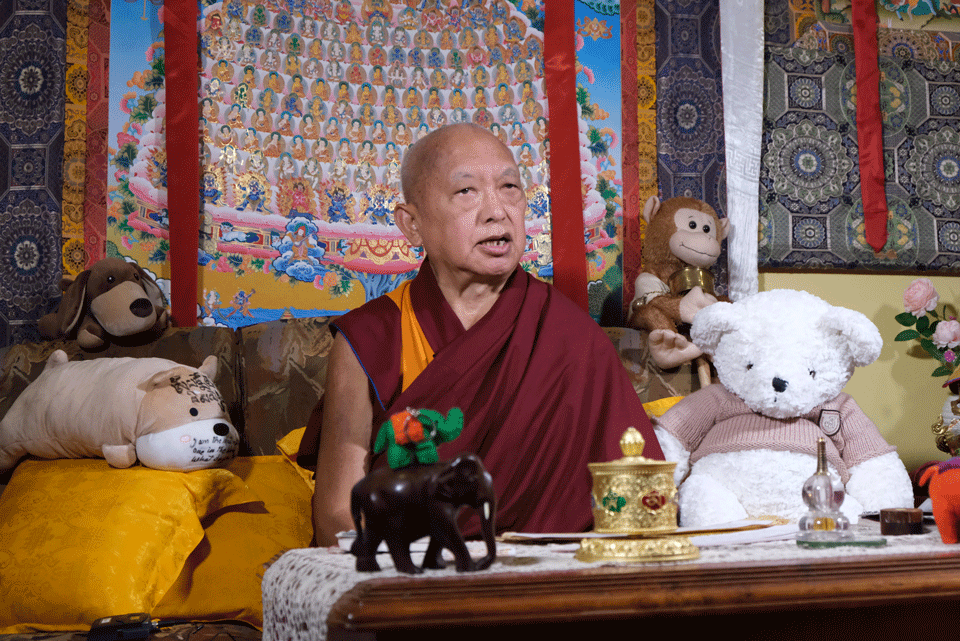
Lama Zopa Rinpoche, Kopan Monastery, Nepal, April 2020. Photo by Ven. Lobsang Sherab.
In a new video from Kopan Monastery in Nepal, Lama Zopa Rinpoche reminds us that the coronavirus, and the suffering that is being experienced from this, can be used to motivate us to practice Dharma, to purify as much as possible, and to practice virtue. Regardless of the method we use, Rinpoche emphasizes that we should do everything with bodhichitta.
Rinpoche explains how to do tonglen practice and how to use this situation to meditate on emptiness, reminding us not just to recite the words, but to think about the meaning. Rinpoche says to not delay even a second the development of our realization of emptiness. Also, we should do our meditations on emptiness, or whatever practice we are undertaking, thinking of the numberless sentient beings, from whom we have received all our happiness from beginningless rebirths, and thinking of how all sentient beings are suffering and have been suffering from beginningless rebirths, by being in samsara.
Rinpoche also talks about the general practice advice for these times, which includes His Holiness the Dalai Lama’s advice to recite the short Tara mantra (OṂ TĀRE TUTTĀRE TURE SVĀHĀ), and the advice from Rangjung Neljorma Khadro Namsel Drönme (Khadro-la) that includes doing the Padmasambhava incense puja and reciting the short Chenrezig mantra (OṂ MAṆI PADME HŪṂ) on the basis of His Holiness the Dalai Lama’s Avalokiteshvara Guru Yoga.
Watch Lama Zopa Rinpoche’s video “Tonglen and Emptiness”:
https://youtu.be/EAVzCNa7tng
- Read the transcript of “Tonglen and Emptiness.”
- Practices mentioned in this teaching include His Holiness the Dalai Lama’s Avalokiteshvara Guru Yoga and Nölsang (Incense Ritual by the Great Master Padmasambhava Called “The Divine Blue Water Clearing Away Contamination).
Find more video teachings by Lama Zopa Rinpoche from Kopan Monastery during the COVID-19 crisis.
Practice advice from our teachers, Dharma study-from-home opportunities, and more can be found on the page “Resources for the Coronavirus Pandemic.”
Lama Zopa Rinpoche is the spiritual director of the Foundation for the Preservation of Mahayana Tradition (FPMT), a Tibetan Buddhist organization dedicated to the transmission of the Mahayana Buddhist tradition and values worldwide through teaching, meditation and community service.
- Tagged: 16 guidelines, advice from lama zopa rinpoche, coronavirus, covid-19, emptiness, khandro kunga bhuma, lama zopa rinpoche, lama zopa rinpoche thought transformation video teaching, tonglen, video
1
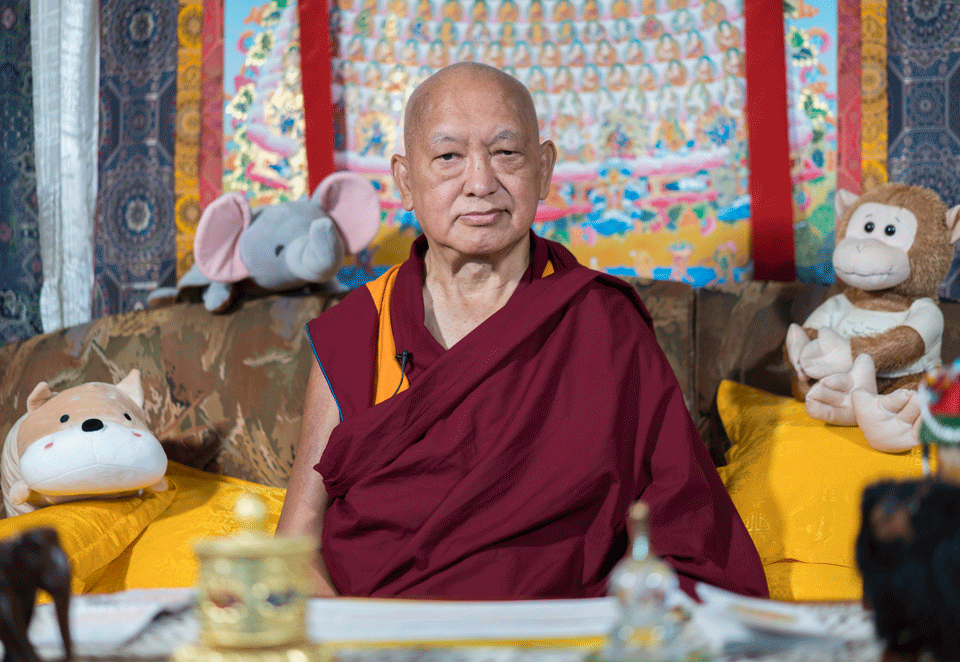
Lama Zopa Rinpoche with “friends,” Kopan Monastery, March 2020. Photo by Ven. Lobsang Sherab.
In a new video from Kopan Monastery in Nepal, Lama Zopa Rinpoche offers an introduction to lojong and tonglen practices. Rinpoche teaches on how to approach these practices in this hour-and-fifteen-minute-long video.
Rinpoche emphasizes the importance of the guru and the importance of having a strong foundation in lamrim practice. In particular, Rinpoche points to teachings on death and impermanence, and how we have had much time but haven’t used it to practice Dharma.
Rinpoche also explains the advice that he received from Rangjung Neljorma Khadro Namsel Drönme (Khadro-la), including her advice on doing His Holiness the Dalai Lama’s (Avalokiteshvara) Guru Yoga and the original plan for the Padmasambhava incense puja at Nepal’s holy sites.
Rinpoche talks about the importance of keeping a healthy and satisfied mind, and of seeing the coronavirus in the context of Dharma:
“What I’m saying is the answer is that you see the mistakes of being in samsara. To get this virus, whatever it is, cancer or anything in the world, to get this, this is the mistakes of being in samsara. From beginningless rebirths up to now we didn’t try anything to get liberated from that. So that is the mistakes of being in samsara. Then, practice Dharma. The answer is—practice Dharma. In that way you keep the mind in a state of happiness, … compassion for living beings, as well as satisfaction.”
Rinpoche concludes the video saying, “So the condition, the virus or whatever it is, is helping you to practice more Dharma. To practice more Dharma. To practice more Dharma—to purify more all the sufferings, all the obstacles, and then to develop the mind in the path to enlightenment.”
Watch Lama Zopa Rinoche’s Introduction to Lojong and Tonglen:
https://youtu.be/5lqAqnxtTw4
- Read the transcript for the teaching “Introduction to Lojong and Tonglen.”
- Practices mentioned in this teaching include His Holiness the Dalai Lama’s Avalokiteshvara Guru Yoga and Nölsang (Incense Ritual by the Great Master Padmasambhava Called “The Divine Blue Water Clearing Away Contamination).
Find more video teachings by Lama Zopa Rinpoche from Kopan Monastery during the COVID-19 crisis.
Practice advice from our teachers, Dharma study-from-home opportunities, and more can be found on the page “Resources for the Coronavirus Pandemic.”
Lama Zopa Rinpoche is the spiritual director of the Foundation for the Preservation of Mahayana Tradition (FPMT), a Tibetan Buddhist organization dedicated to the transmission of the Mahayana Buddhist tradition and values worldwide through teaching, meditation and community service.
- Tagged: advice from lama zopa rinpoche, avalokiteshvara, coronavirus, guru yoga, lama zopa rinpoche, lama zopa rinpoche thought transformation video teaching, video
31
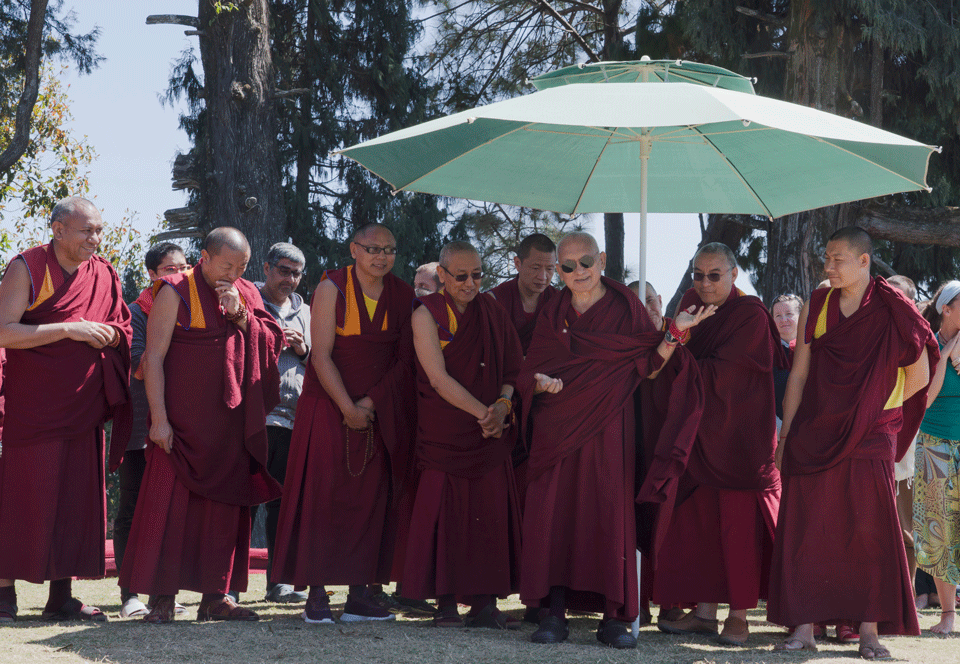
Lama Zopa Rinpoche going to do a Padmasambhava incense puja, Kopan Monastery, March 2020. Photo by Ven. Lobsang Sherab.
A student wrote to Lama Zopa Rinpoche about his anger and its impact on other people. The following is an extract of Rinpoche’s reply to the student.
This is really an opportunity to practice the path of patience. The purpose of practicing patience is to have immediate peace and happiness within you. That moment when you don’t get angry means you don’t harm yourself, you don’t cause yourself unhappiness. When the mind becomes negative, it is like a bomb inside you.
Even if you are killed in a war by a bomb, it doesn’t necessarily mean you have to be born in the lower realms; you can be born in the upper realms. The bomb of anger is billions of times worse for you than any external bomb. When it arises, you create negative karma and throw yourself into the three lower realms, where you have to experience terrible suffering for an incredibly long time—for eons!
It is said by Shantideva in A Guide to the Bodhisattva Way of Life that the negative karma created by one second of anger causes us to experience the three lower realms for eons—one can’t be reborn in the realm of a happy transmigratory being. There is no need to mention the negative karma collected from infinite past lives.
Another quote is that the merit collected for one thousand years by making charity and offerings to Those Gone to Bliss and so forth is destroyed by one second of anger.
The first quote is saying how much anger causes you to suffer in the three lower realms. The second one is concerned with destroying eons of merit. The third disadvantage is that anger delays realizations, depending on who you get angry with and who you create the negative karma with. Then, anger also causes you to have an ugly body in your future lives. Practicing patience brings you a beautiful body in future lives.
In this way, anger is unbelievably harmful to oneself. Being angry just one time is so harmful, so you can imagine if it happens all day long or for weeks, months, or years. It is terrifying to think about. Just being angry one time brings so much suffering.
If you are angry you can’t really work with others. They get upset and leave, because they are so unhappy with you, and seeing this also makes you unhappy. Also, if you get angry, it makes others angry, and then this makes you angry again! You make yourself the target for others to get angry at you and harm you with harsh speech and dislike. If anger gets worse, it can even cause physical harm.
If you are patient, you don’t get angry at sentient beings. In that way, sentient beings only receive peace and happiness from you. Each time you stop being angry, by practicing patience, this becomes your most practical contribution to world peace. It brings so much peace and happiness to your own world, mind, and heart. For others, it brings peace and happiness, not only in this world, but for all living beings. If you are able to practice patience in this life, it will be much easier in future lives. By developing your mind in patience through the continuity of lives, you will bring happiness to all living beings.
Also, each time you come closer to completing the perfection of patience, it means you are getting closer to enlightenment, and much closer to bringing all sentient beings to enlightenment. So, you can see that each time you practice patience, there are long-term results. This is the power of the mind. Not only can you bring sentient beings temporary peace, but also full enlightenment.
This advice “Dealing with Anger” was originally published in “Lama Zopa Rinpoche’s Online Advice Book” on the Lama Yeshe Wisdom Archive website:
https://lamayeshe.com/advice/dealing-anger
For detailed advice on the practices recommended by Lama Zopa Rinpoche for the coronavirus pandemic, please visit the page “Advice from Lama Zopa Rinpoche for Coronavirus.”
https://fpmt.org/fpmt/announcements/resources-for-coronavirus-pandemic/advice-from-lama-zopa-rinpoche-for-coronavirus/
Additional resources, including Dharma study-from-home opportunities, can be found on the page “Resources for the Coronavirus Pandemic.”
https://fpmt.org/fpmt/announcements/resources-for-coronavirus-pandemic/
Lama Zopa Rinpoche is the spiritual director of the Foundation for the Preservation of Mahayana Tradition (FPMT), a Tibetan Buddhist organization dedicated to the transmission of the Mahayana Buddhist tradition and values worldwide through teaching, meditation and community service.
30
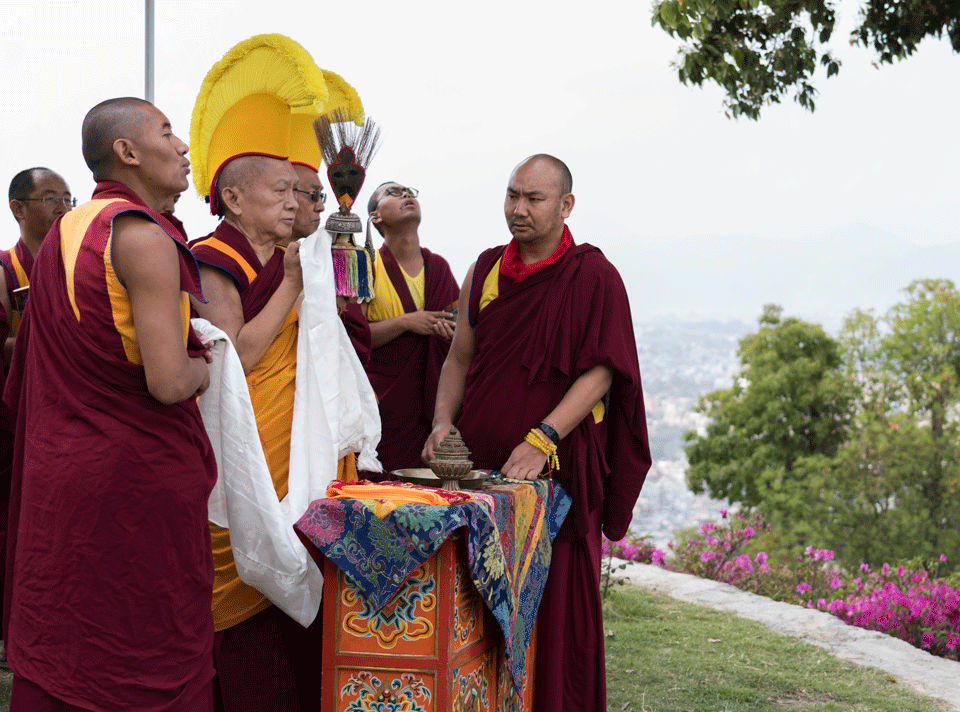
Lama Zopa Rinpoche during a Padmasambhava incense puja, Kopan Monastery, Nepal, March 2020. Photo by Ven. Lobsang Sherab.
In a new video, Lama Zopa Rinpoche gives advice and an oral transmission (lung) of the Verses for the Eight Auspicious Noble Ones to stop the coronavirus disease (COVID-19) and to bring success.
After a brief introduction from young Kopan Monastery monks, Rinpoche begins with an extensive motivational teaching for receiving the lung. “Now this virus is happening, so then now an examination is happening to you,” Rinpoche says in the 50-minute video (transcript here).
“You have to check your mind. An examination is happening as to whether you are afraid of death, whether you are afraid of sicknesses, or you don’t mind, [whether] for you it is not important, not something that you are scared of, a kind of a huge thing like a mountain, a kind of obstacle to you. Now it is really interesting to examine your mind. Really, very interesting. So that shows how much Dharma practice you normally do, day and night how much your mind becomes Dharma, how much your mind has become Dharma. So that is very interesting.”
The Verses for the Eight Auspicious Noble Ones is by the “great, great, great holy being Je Miphampa,” Rinpoche explains. It is often recited to bring success to a project.
“The biggest project, of course, is for yourself to achieve enlightenment as quickly as possible because numberless sentient beings are suffering—most unbelievable—in samsara. They have been experiencing that from beginningless rebirths—wow, wow, wow, you can’t imagine it—in the six realms, over and over, without beginning. Wow, already it is like that—not just suffering. Bah, bah, bah. So, to free them from the oceans of samsaric sufferings and bring them to enlightenment, for their success, what else is a greater project than that? For the success of this: I mean not just only the virus to stop it bringing sickness, the coronavirus. Not just that. Okay. …”
Rinpoche concludes the video by offering the oral transmission of the Verses for the Eight Auspicious Noble Ones in English.
Watch the new video from Lama Zopa Rinpoche—”Motivation and Oral Transmission for Success”:
https://youtu.be/GKJ-K3_Btdc
- Read a transcript of this video.
- Follow the oral transmission of the Verses for the Eight Noble Auspicious Ones.
Find more video teachings by Lama Zopa Rinpoche from Kopan Monastery during the COVID-19 crisis.
Practice advice from our teachers, Dharma study-from-home opportunities, and more can be found on the page “Resources for the Coronavirus Pandemic.”
Lama Zopa Rinpoche is the spiritual director of the Foundation for the Preservation of Mahayana Tradition (FPMT), a Tibetan Buddhist organization dedicated to the transmission of the Mahayana Buddhist tradition and values worldwide through teaching, meditation and community service.
- Tagged: advice from lama zopa rinpoche, coronavirus, lama zopa rinpoche, lama zopa rinpoche thought transformation video teaching, oral transmission, practice, verses for the eight auspicious noble ones, video
28
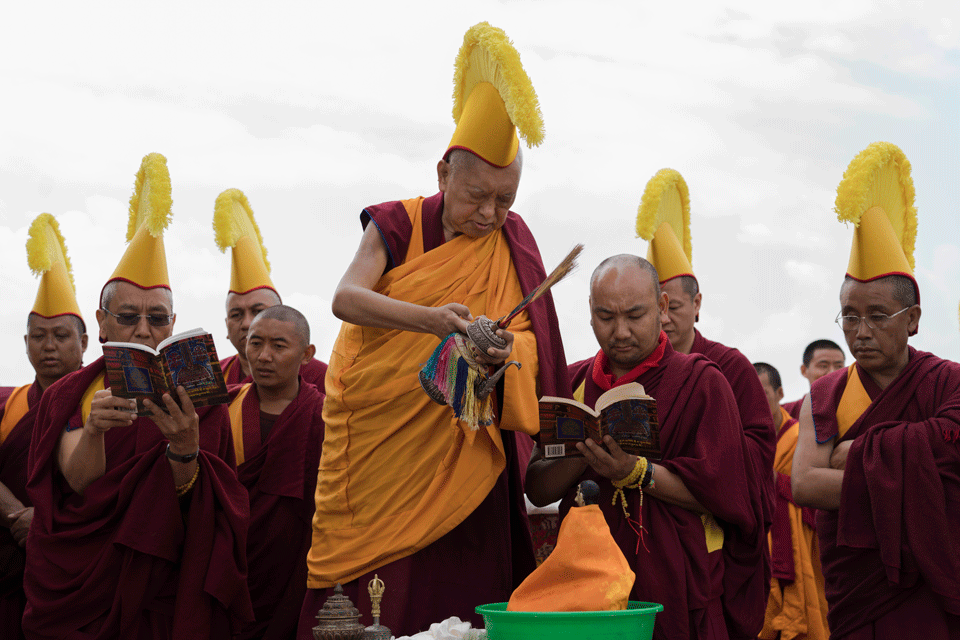
Lama Zopa Rinpoche, Khen Rinpoche Geshe Chonyi, and senior Kopan monks during Padmasambhava incense puja, Kopan Monastery, Nepal, March 2020. Photo by Ven. Lobsang Sherab.
Lama Zopa Rinpoche, Khen Rinpoche Geshe Chonyi, and senior Kopan Monastery monks performed a Padmasambhava incense puja to benefit beings affected by COVID-19 and to help mitigate the spread of the novel coronavirus.
Lama Zopa Rinpoche consulted with Rangjung Neljorma Khadro Namsel Drönme (Khadro-la) about what pujas to do to help the pandemic, and it came out that the Padmasambhava incense puja was best at this time.
The coordinated incense puja was done by about ten high lamas around Kathmandu. Originally the puja was planned to be done in various holy places in Nepal, but due to the current situation, it was changed so that the puja would be done by each lama at the same time in their respective monasteries.
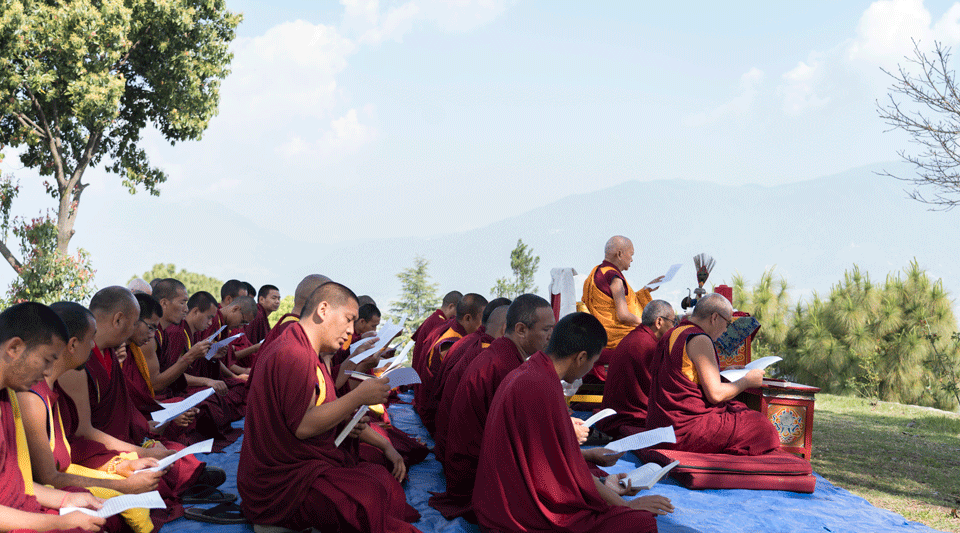
Lama Zopa Rinpoche, Khen Rinpoche Geshe Chonyi, and senior Kopan monks during Padmasambhava incense puja, Kopan Monastery, Nepal, March 2020. Photo by Ven. Lobsang Sherab.
During the puja at Kopan, prayers and practices were offered in the four directions.
Rinpoche continues to discuss with Khadro-la other practices that can be done to help people who are sick and stop the spread of COVID-19 and for the benefit of beings who are affected by the coronavirus.
Watch a short video of scenes from the Padmasambhaba incense puja at Kopan Monastery:
https://youtu.be/pyXORzZ_rmU
For detailed advice on the practices recommended by Lama Zopa Rinpoche to mitigate the coronavirus pandemic, please visit the page “Advice from Lama Zopa Rinpoche for Coronavirus.”
https://fpmt.org/fpmt/announcements/resources-for-coronavirus-pandemic/advice-from-lama-zopa-rinpoche-for-coronavirus/
Additional resources, including Dharma study-from-home opportunities, can be found on the page “Resources for the Coronavirus Pandemic.”
https://fpmt.org/fpmt/announcements/resources-for-coronavirus-pandemic/
Lama Zopa Rinpoche is the spiritual director of the Foundation for the Preservation of Mahayana Tradition (FPMT), a Tibetan Buddhist organization dedicated to the transmission of the Mahayana Buddhist tradition and values worldwide through teaching, meditation and community service.
26
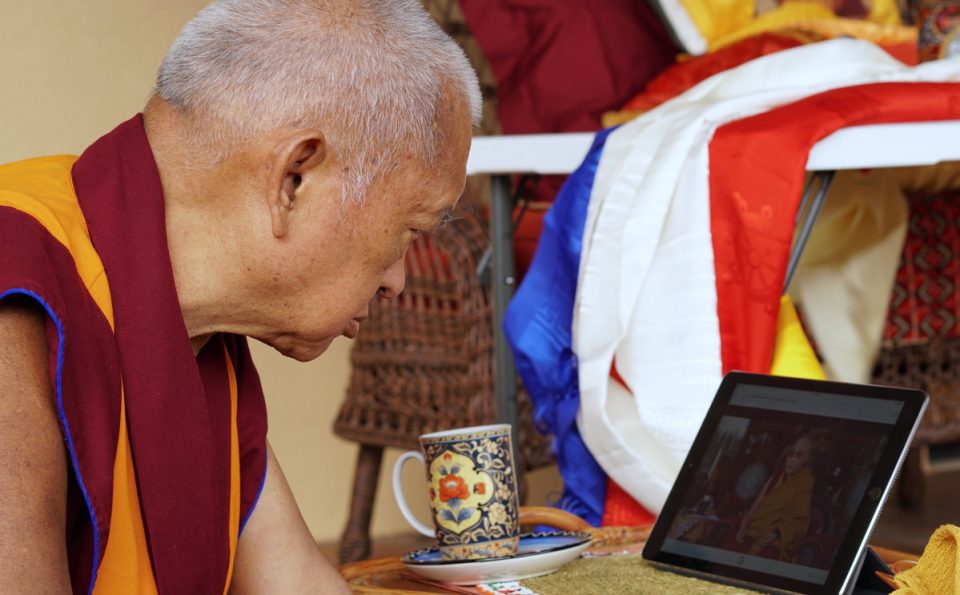
Lama Zopa Rinpoche watching a teaching with His Holiness the Dalai Lama on a tablet. Photo by Ven. Lobsang Sherab.
Dharma practitioners around the world have been advised to isolate themselves from others as much as possible to reduce the spread of the coronavirus. This can be a challenge to those wishing to study without access to their local centers.
We are offering several FPMT Online Learning Center programs to any student or center who would like to use them. (Please note: Students who are new to the Online Learning Center will need to create an account. For details, see “Getting Started Guide.”)
- Discovering Buddhism: Module 11, Transforming Problems
Enrollment key: tonglen33 - Basic Program: Mahayana Mind Training, Wheel of Sharp Weapons
Enrollment key: lojong100 - Living in the Path
We have made this entire program available for free. Find the enrollment keys for the individual modules here. - Living in the Path (Spanish)
This program is also in Spanish and is available for free. Find the enrollment keys for individual modules here. - Discovering Buddhism (French)
All of the modules of Discovering Buddhism in French are available for free and do not require enrollment keys.
Additionally, students are welcome to access complete teachings of Lama Zopa Rinpoche via Rinpoche Available Now. Find video of recent and archive teachings from Nepal, Russia, Singapore, Latvia, France, and many other teaching events.
Please also visit the Lama Yeshe Wisdom Archive for freely available teachings by Lama Yeshe and Lama Zopa Rinpoche in a variety of digital formats.
We hope that students will take full advantage of these opportunities during this isolating time of uncertainty.
For detailed advice on the practices recommended by Lama Zopa Rinpoche to mitigate the coronavirus pandemic, please visit the page “Advice from Lama Zopa Rinpoche for Coronavirus.”
https://fpmt.org/fpmt/announcements/resources-for-coronavirus-pandemic/advice-from-lama-zopa-rinpoche-for-coronavirus/
Through comprehensive study programs, practice materials, and training seminars, FPMT Education nourishes the development of compassion, wisdom, kindness, and true happiness in individuals of all ages.
- Tagged: coronavirus, covid-19, online education
25
A new video from Lama Zopa Rinpoche focuses on advice for students supporting someone who is dying. Rinpoche recorded this video in March 2020 at Kopan Monastery in Nepal.
In the video, Lama Zopa Rinpoche recites various mantras and teaches on their benefits. These mantras can be used to support a person who is dying.
Rinpoche teaches on:
- Buddha’s Name Mantra (Rinchhen Tsugtorchen Name Mantra)
- the short Chenrezig mantra
- Lotus Pinnacle of Amoghaspasha Mantra
- Celestial Mansion Extremely Secret Sublime Success
- Maitreya Buddha mantras (root mantra, heart mantra, and close heart mantra)
- the short Medicine Buddha mantra
- the short Namgyalma mantra
- Mantra from “The Sutra of Great Liberation”
Watch “Lama Zopa Rinpoche’s Advice to a Person Who is Dying” on YouTube:
https://youtu.be/wmIVjkVDyVE
- Read the transcript of this teaching.
- Find the mantras to recite for the dying discussed in this video.
- Find additional resources for the dying and other mantras on FPMT.org.
For detailed advice on the practices recommended by Lama Zopa Rinpoche for the coronavirus pandemic, please visit the page “Advice from Lama Zopa Rinpoche for Coronavirus.”
Additional resources, including Dharma study-from-home opportunities, can be found on the page “Resources for the Coronavirus Pandemic.”
Lama Zopa Rinpoche is the spiritual director of the Foundation for the Preservation of Mahayana Tradition (FPMT), a Tibetan Buddhist organization dedicated to the transmission of the Mahayana Buddhist tradition and values worldwide through teaching, meditation and community service.
- Tagged: coronavirus, covid-19, death and dying, lama zopa rinpoche thought transformation video teaching, video
23
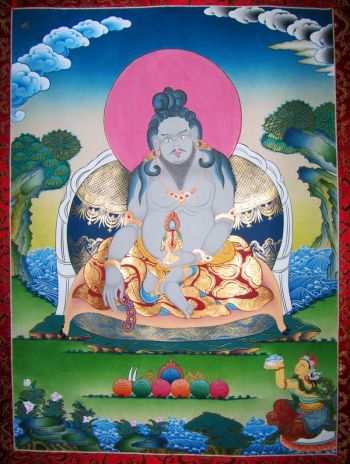
Thangtong Gyalpo
We recently shared a new video from Lama Zopa Rinpoche in which Rinpoche shares his advice for practices concerning protection and healing from coronavirus disease (COVID-19) as well as oral transmissions of the Vajra Armor mantra and four other recommended prayers.
FPMT Education Services is pleased to share a draft transcript of this advice. All are welcome to download this to your device or read online.
For more detailed advice on the practices recommended by Rinpoche, please visit the page “Advice from Lama Zopa Rinpoche for Coronavirus.”
Additional resources for this difficult time, including Dharma study-from-home opportunities, can be found on the page “Resources for the Coronavirus Pandemic.”
Through comprehensive study programs, practice materials, and training seminars, FPMT Education nourishes the development of compassion, wisdom, kindness, and true happiness in individuals of all ages.
19
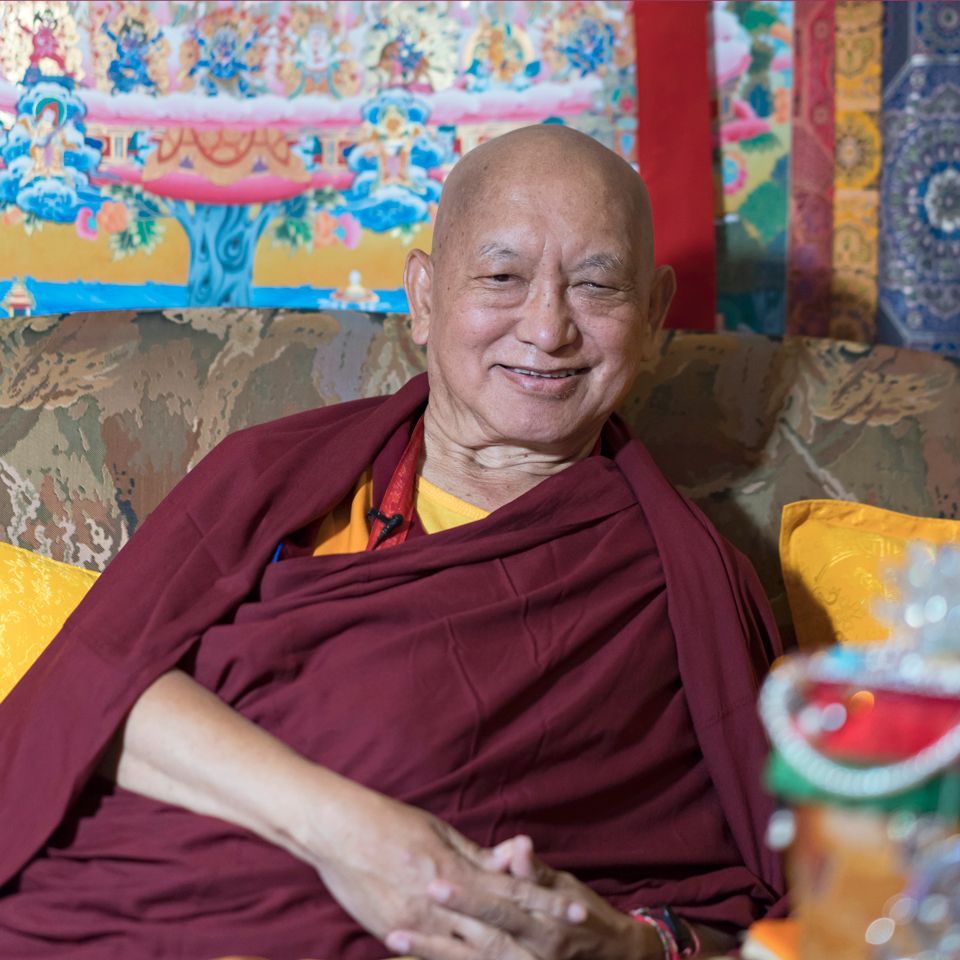
Lama Zopa Rinpoche at Kopan Monastery, Nepal, March 2020. Photo by Ven. Lobsang Sherab.
There is a new video from Lama Zopa Rinpoche on his advice for practices for coronavirus disease (COVID-19). Rinpoche recorded this video in March 2020 at Kopan Monastery in Nepal.
The new video from Lama Zopa Rinpoche begins with a teaching and motivation for doing the practices. Then Rinpoche gives additional advice along with the oral transmission of a mantra and four prayers.
Watching this video attentively can qualify as having received the oral transmission of the following mantra and prayers, if viewed with the intention of receiving the oral transmission from Lama Zopa Rinpoche.
Watch video of Lama Zopa Rinpoche’s Advice for Coronavirus Disease (COVID-19):
https://youtu.be/O7oTHLEQn6Y
In this video Rinpoche gives the following oral transmission:
- Vajra Armor mantra (this mantra is recommended in “Advice to Protect Yourself and Others from the Coronavirus” from Rinpoche.)
- Swift Fulfillment of Wishes in Dependence on the Great Jetsun Tsongkhapa
- The Vajra Speech of Mahasiddha Thangtong Gyalpo: The Blessed Prayer Known as “Liberating Sakya from Disease” (This prayer is recommended in “Advice to Protect Yourself and Others from the Coronavirus” from Rinpoche.)
- The Vajra Speech of Mahasiddha Thangtong Gyalpo: Words of Truth Pacifying the Danger of Weapons
- The Speech of Mahasiddha Thangtong Gyalpo: A Request to Pacify the Fear of Famine
Read the transcript of this video.
For more detailed advice on the practices recommended by Rinpoche, please visit the page “Advice from Lama Zopa Rinpoche for Coronavirus.”
Additional resources for this difficult time, including Dharma study-from-home opportunities, can be found on the page “Resources for the Coronavirus Pandemic.”
Lama Zopa Rinpoche is the spiritual director of the Foundation for the Preservation of Mahayana Tradition (FPMT), a Tibetan Buddhist organization dedicated to the transmission of the Mahayana Buddhist tradition and values worldwide through teaching, meditation and community service.
- Tagged: advice from lama zopa rinpoche, coronavirus, covid-19, lama zopa rinpoche thought transformation video teaching, oral transmission, video
18
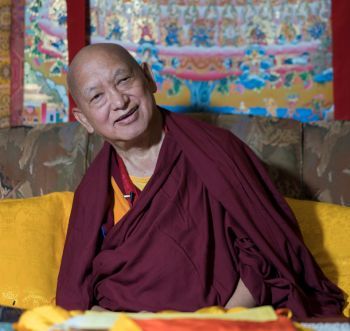
Lama Zopa Rinpoche at Kopan Monastery, Nepal, March 2020. Photo by Ven. Lobsang Sherab.
In these challenging and anxious times, FPMT International Office offers our prayers and best wishes to all who are navigating uncertainty and change during the coronavirus pandemic.
We have created a page of resources and advice related to this crisis in order to make it as easy as possible for you to find recommended practices, prayers, online study and practice resources, and news about Lama Zopa Rinpoche and from around the FPMT organization.
This page will be updated as new advice and news become available and should be consulted as an up-to-date resource for Dharma practice during the time of this pandemic.
Find advice from Lama Zopa Rinpoche, Dharma study materials, and other updates on “Resources for the Coronavirus Pandemic” page on FPMT.org:
https://fpmt.org/fpmt/announcements/resources-for-coronavirus-pandemic/
Lama Zopa Rinpoche is the spiritual director of the Foundation for the Preservation of Mahayana Tradition (FPMT), a Tibetan Buddhist organization dedicated to the transmission of the Mahayana Buddhist tradition and values worldwide through teaching, meditation and community service.
- Tagged: coronavirus, covid-19
16
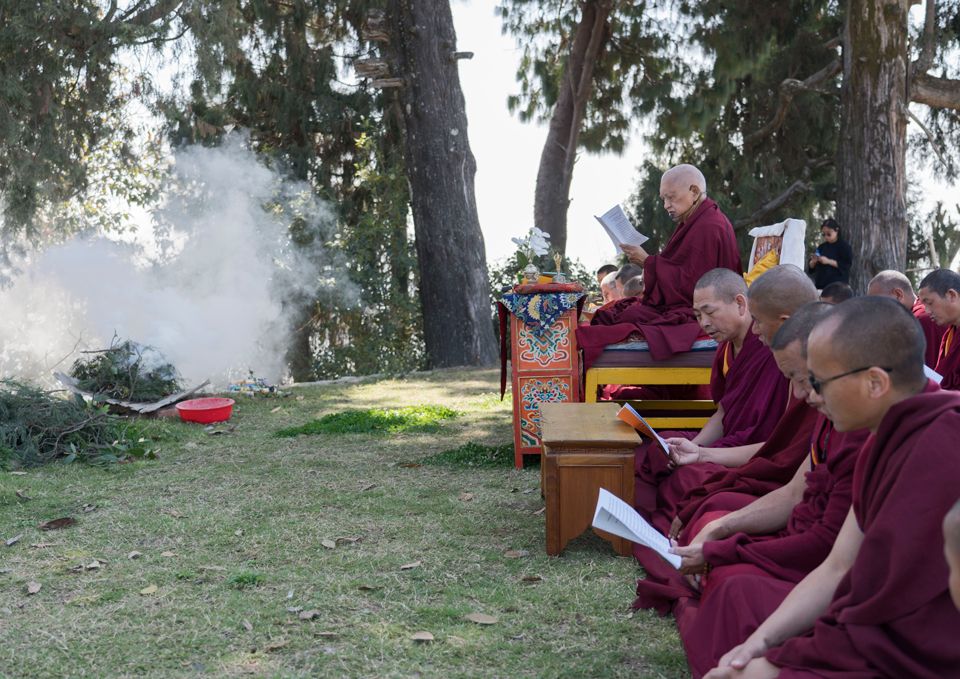
Lama Zopa Rinpoche doing incense puja at Kopan Monastery, Nepal, March 2020. Photo by Ven. Losang Sherab.
Lama Zopa Rinpoche, Khen Rinpoche Geshe Chonyi, and ordained Sangha offered a Padmasambhava incense puja at Kopan Monastery in Nepal in response to the global coronavirus pandemic.
Watch a Short Video of the Incense Puja at Kopan Monastery:
https://youtu.be/5-hPIH5xAlI
Advice from Rinpoche on Coronavirus
Lama Zopa Rinpoche has offered the following advice to protect from harm by the novel coronavirus:
- Lama Zopa Rinpoche Offers Advice to Protect from the Coronavirus
- Additional Advice from Lama Zopa Rinpoche to Protect from the Coronavirus
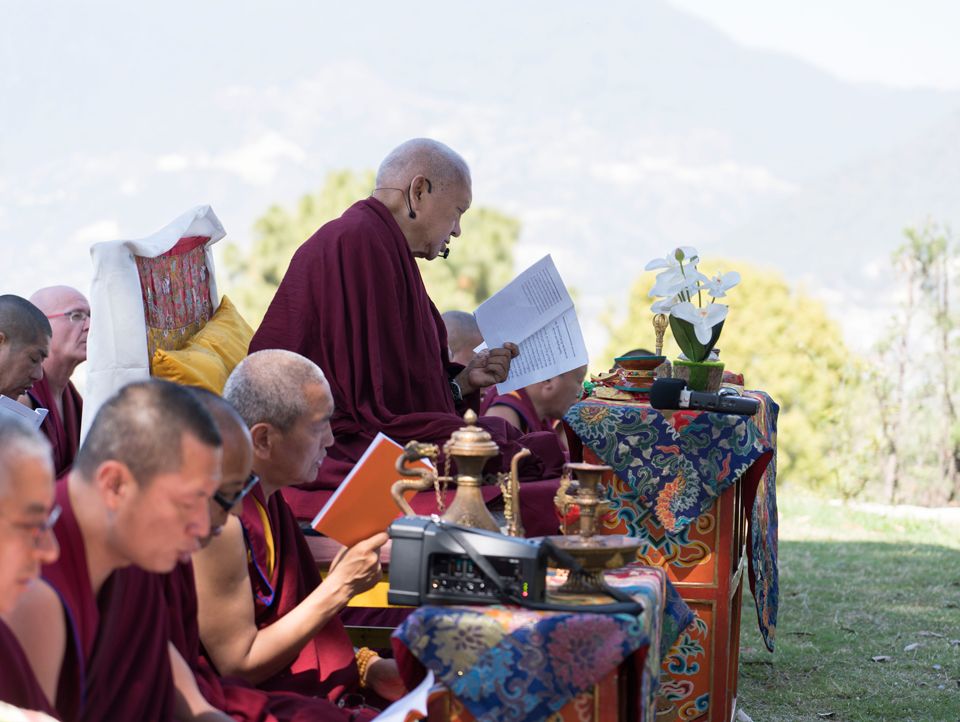
Lama Zopa Rinpoche doing incense puja at Kopan Monastery, Nepal, March 2020. Photo by Ven. Losang Sherab.
Lama Zopa Rinpoche is the spiritual director of the Foundation for the Preservation of Mahayana Tradition (FPMT), a Tibetan Buddhist organization dedicated to the transmission of the Mahayana Buddhist tradition and values worldwide through teaching, meditation and community service.
Find links to recordings of Lama Zopa Rinpoche’s recent teachings from Nepal, Russia, Singapore, Latvia, France, and more:
https://fpmt.org/media/streaming/teachings-of-lama-zopa-rinpoche/
- Tagged: coronavirus, covid-19, incense ritual, kopan monastery, lama zopa rinpoche, puja, video
- Home
- News/Media
- Study & Practice
- About FPMT Education Services
- Latest News
- Programs
- New to Buddhism?
- Buddhist Mind Science: Activating Your Potential
- Heart Advice for Death and Dying
- Discovering Buddhism
- Living in the Path
- Exploring Buddhism
- FPMT Basic Program
- FPMT Masters Program
- FPMT In-Depth Meditation Training
- Maitripa College
- Lotsawa Rinchen Zangpo Translator Program
- Universal Education for Compassion & Wisdom
- Online Learning Center
- Prayers & Practice Materials
- Overview of Prayers & Practices
- Full Catalogue of Prayers & Practice Materials
- Explore Popular Topics
- Benefiting Animals
- Chenrezig Resources
- Death & Dying Resources
- Lama Chopa (Guru Puja)
- Lama Zopa Rinpoche: Compendium of Precious Instructions
- Lama Zopa Rinpoche: Life Practice Advice
- Lama Zopa Rinpoche Practice Series
- Lamrim Resources
- Mantras
- Prayer Book Updates
- Purification Practices
- Sutras
- Thought Transformation (Lojong)
- Audio Materials
- Dharma Dates – Tibetan Calendar
- Translation Services
- Publishing Services
- Teachings and Advice
- Find Teachings and Advice
- Lama Zopa Rinpoche Advice Page
- Lama Zopa Rinpoche: Compendium of Precious Instructions
- Lama Zopa Rinpoche Video Teachings
- ༧སྐྱབས་རྗེ་བཟོད་པ་རིན་པོ་ཆེ་མཆོག་ནས་སྩལ་བའི་བཀའ་སློབ་བརྙན་འཕྲིན།
- Podcasts
- Lama Yeshe Wisdom Archive
- Buddhism FAQ
- Dharma for Young People
- Resources on Holy Objects
- Ways to Offer Support
- Centers
- Affiliates Area
- Teachers
- Projects
- Charitable Projects
- Make a Donation
- Applying for Grants
- News about Projects
- Other Projects within FPMT
- Support International Office
- Projects Photo Galleries
- Give Where Most Needed
- FPMT
- Shop
Translate*
*powered by Google TranslateTranslation of pages on fpmt.org is performed by Google Translate, a third party service which FPMT has no control over. The service provides automated computer translations that are only an approximation of the websites' original content. The translations should not be considered exact and only used as a rough guide.You are responsible for your own problems just as you’re responsible for your own liberation and enlightenment.







